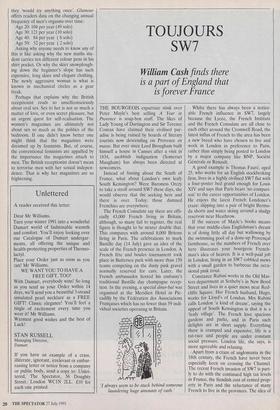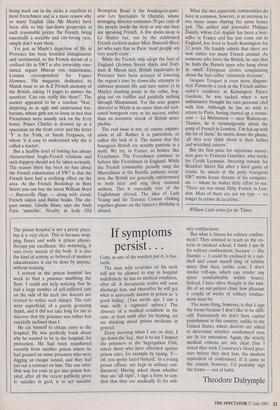TOUJOURS SW7
William Cash finds there
is a part of England that is forever France
THE BOURGEOIS expatriate stink over Peter Mayle's best selling A Year in Provence is soap-box stuff. The likes of Lady Young of Dartington and Sir Terence Conran have claimed their civilised par- adise is being ruined by hoards of literary tourists now descending on Provence en masse. But ever since Lord Brougham built himself a house in Cannes after a visit in' 1834, snobbish indignation (Somerset Maugham) has always been directed at newcomers.
Instead of fussing about the South of France, what about London's own leafy South Kensington? Were Baroness Orczy to take a stroll around SW7 these days, she would observe that the seeking here and there is over. Today, those damned Frenchies are everywhere.
The French Consulate say there are offi- cially 43,000 French living in Britain, although, so many fail to register, the real figure is thought to be nearer double that. This compares with around 8,000 Britons living in Paris. The celebrations to mark Bastille day (14 July) gave an idea of the scale of the French presence in London. A French fête and boules tournament took place in Battersea park with more than 150 teams competing on the dusty pink gravel normally reserved for cars. Later, the French ambassador hosted his embassy's traditional Bastille day champagne recep- tion. In the evening, a special diner-bal was organised at the Meridien Hotel in Pic- cadilly by the Federation des Associations Frangaises which has no fewer than 59 indi- vidual societies operating in Britain.
'I always seem to be stuck behind someone laundering huge amounts of cash.' Whilst there has always been a notice- able French influence in SW7, largely because the Lycee, the French Institute and the French Consulate are all close to each other around the Cromwell Road, the latest influx of French to the area has been a new breed who have chosen to live and work in London in preference to Paris, rather than simply being posted to London by a major company like BNP, Societe Generale or Renault.
A good example is Thomas Faure, aged 25, who works for an English stockbroking firm, lives in a highly civilised SW7 flat with a four-poster bed grand enough for Louis XIV and says that Paris bears 'no compari- son' to the career opportunities of London. He enjoys the latest French Londoner's craze: slipping into a pair of bright Bermu- da shorts and water skiing around a sludgy reservoir near Heathrow.
If the success of Mayle's books means that your middle-class Englishman's dream is of doing little all day but wallowing by the swimming pool of a done-up Provencal farmhouse, so the numbers of French over here illustrates your bourgeois French- man's idea of heaven. It is a well-paid job in London, living in an SW7 cobbled mews with a small garden to barbecue the occa- sional pink trout.
Constance Rubini works in the Old Mas- ters department at Sotheby's in New Bond Street and lives in a quiet mews near Red- cliffe Square. Her French husband, Hugo, works for Lloyd's of London. Mrs Rubini calls London 'a kind of dream', saying the appeal of South Kensington is that it is a `leafy village'. The French love spacious gardens and parks, and in Paris such delights are in short supply. Everything there is cramped and expensive, life is a rat-race and people are under constant social pressure. London life, she says, is more agreeable and relaxing.
Apart from a craze of anglomania in the 18th century, the French have never been especially keen on crossing the Channel. The recent French invasion of SW7 is part- ly to do with the continued high tax levels in France, the fiendish cost of rented prop- erty in Paris and the reluctance of many French to live in the provinces. The idea of being stuck out in the sticks is repellent to most Frenchmen and is a main reason why so many English (like Mr Mayle) have been able to buy run-down properties at such reasonable prices: the French, being essentially a sociable and city-loving race, simply don't want them.
Yet just as Mayle's depiction of life in Provence has been branded disingenuous and sentimental, so the French dream of a civilised life in SW7 is also invariably rose- tinted, argues Marcus von Ackermann, London correspondent for Vogues Hommes. His magazine dedicated its March issue to an A-Z French anatomy of the British, taking 14 pages to answer the question: 'Can one really like them?'. The answer appeared to be a resolute 'Non', depicting us as ugly and undersexed bar- barians, whose girls are so lousy in bed that Frenchmen were usually sick on the ferry home. Prince Charles is dressed up as a spaceman on the front cover and the letter `Y' is for York, or Sarah Ferguson, of whom 'it is easy to understand why she is called a tractor'.
But a healthy level of baiting has always characterised Anglo-French relations and such frippery should not be taken seriously. The reason there has been no fuss about the French colonisation of SW7 is that the French have had a civilising effect on the area. At the French Bookshop in Bute Street you can buy the latest William Boyd — Brazzaville Plage — along with classic French videos and Babar books. The ele- gant owner, Giselle Shaw, says she finds Paris 'anarchic'. Nearby in leafy Old
Brompton Road is the boulangerie-patis- serie Les Specialites St Quentin, whose managing director estimates 70 per cent of the people inside the shop at any one time are speaking French. A few doors away is Le Shaker bar, run by the celebrated French cocktail-maker Marc Boccard-Shus- ter who says that in Paris 'most people are very nearly crazy'.
While the French only adopt the best of England (Jermyn Street shirts and Fort- num & Mason tea), British expatriates in Provence have been accused of lowering the region's tone by clown-like attempts to embrace peasant life and turn native (a la Mayle): stashing pastis in the cellar, hog- ging out on truffles and painfully inching through Maupassant. Yet the sour grapes directed at Mayle is no more than old fash- ioned bourgeois envy at his success, rather than an eccentric streak of British xeno- phobia. The real issue is not, of course, expatri- atism at all. Rather it is patriotism, or rather the lack of it. The notion that the bourgeois British are notably patriotic is a myth. We try, in France, to behave like Frenchmen. The Frenchmen continue to behave like Frenchmen in England. While the French community proudly sang the Marseillaise at the Bastille embassy recep- tion, the British are generally embarrassed to both hear and sing their national anthem. This is especially true of the Englishman abroad. The idea of Lady Young and Sir Terence Conran clinking together glasses on the Queen's Birthday is absurd. What the two expatriate communities do have in common, however, is an aversion to too many noses sharing the same honey pot. The author and journalist Philippe Dandy, whose Les Anglais has been a best- seller in France and has just come out in England, has lived in South Kensington for 12 years. He frankly admits that there are now rather too many French around. As someone who loves the British, he says that he finds the French types who hang about in small European circles complaining about the bad coffee 'extremely tiresome'.
Jacques Troquet is even more disgrun- tled. Formerly a cook at the French ambas- sador's residence in Kensington Palace Gardens, he was sacked when a new ambassador brought his own personal chef with him. Although he has no wish to return to Paris, having started up a restau- rant — La Malmaison — near Walton-on- Thames, he is curmudgeonly about the army of French in London. 'I'm fed up with the lot of them,' he snorts down the phone, `all they ever think about is their bellies and wretched careers.'
But the first prize for expatriate snooti- ness goes to Francois Gauthier, who works for Credit Lyonnais. Sweating outside his Beaufort Street flat after a hard game of tennis, he sneers at the petty bourgeois SW7 mews house dreams of his compatri- ots — whom he makes little effort to see. `There are too many filthy French in Lon- don. Most of them are not my type — no longer la creme de la creme.'
William Cash writes for the Times.



















































 Previous page
Previous page